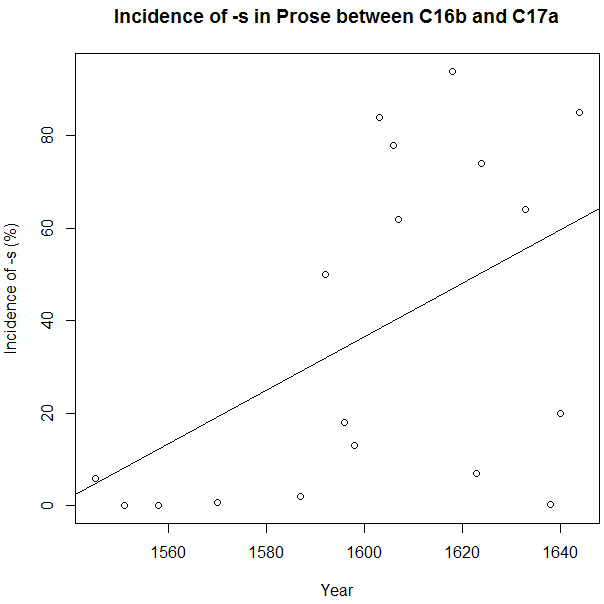初期近代英語における動詞現在人称語尾 -th → -s の変化については,「#1855. アメリカ英語で先に進んでいた3単現の -th → -s」 ([2014-05-26-1]),「#1856. 動詞の直説法現在形語尾 -eth は17世紀前半には -s と発音されていた」 ([2014-05-27-1]),「#1857. 3単現の -th → -s の変化の原動力」 ([2014-05-28-1]),「#2141. 3単現の -th → -s の変化の概要」 ([2015-03-08-1]) などで取り上げてきた.今回,この問題に関連して Bambas の論文を読んだ.現在の最新の研究成果を反映しているわけではないかもしれないが,要点が非常によくまとまっている.
英語史では,1600年辺りの状況として The Authorised Version で不自然にも3単現の -s が皆無であることがしばしば話題にされる.Bacon の The New Atlantis (1627) にも -s が見当たらないことが知られている.ここから,当時,文学的散文では -s は口語的にすぎるとして避けられるのが普通だったのではないかという推測が立つ.現に Jespersen (19) はそのような意見である.
Contemporary prose, at any rate in its higher forms, has generally -th'; the s-ending is not at all found in the A[uthorized] V[ersion], nor in Bacon A[tlantis] (though in Bacon E[ssays] there are some s'es). The conclusion with regard to Elizabethan usage as a whole seems to be that the form in s was a colloquialism and as such was allowed in poetry and especially in the drama. This s must, however, be considered a licence wherever it occurs in the higher literature of that period. (qtd in Bambas, p. 183)
しかし,Bambas (183) によれば,エリザベス朝の散文作家のテキストを広く調査してみると,実際には1590年代までには文学的散文においても -s は容認されており,忌避されている様子はない.その後も,個人によって程度の違いは大きいものの,-s が避けられたと考える理由はないという.Jespersen の見解は,-s の過小評価であると.
The fact seems to be that by the 1590's the -s-form was fully acceptable in literary prose usage, and the varying frequency of the occurrence of the new form was thereafter a matter of the individual writer's whim or habit rather than of deliberate selection.
さて,17世紀に入ると -th は -s に取って代わられて稀になっていったと言われる.Wyld (333--34) 曰く,
From the beginning of the seventeenth century the 3rd Singular Present nearly always ends in -s in all kinds of prose writing except in the stateliest and most lofty. Evidently the translators of the Authorized Version of the Bible regarded -s as belonging only to familiar speech, but the exclusive use of -eth here, and in every edition of the Prayer Book, may be partly due to the tradition set by the earlier biblical translations and the early editions of the Prayer Book respectively. Except in liturgical prose, then, -eth becomes more and more uncommon after the beginning of the seventeenth century; it is the survival of this and not the recurrence of -s which is henceforth noteworthy. (qtd in Bambas, p. 185)
だが,Bambas はこれにも異議を唱える.Wyld の見解は,-eth の過小評価であると.つまるところ Bambas は,1600年を挟んだ数十年の間,-s と -th は全般的には前者が後者を置換するという流れではあるが,両者並存の時代とみるのが適切であるという意見だ.この意見を支えるのは,Bambas 自身が行った16世紀半ばから17世紀半ばにかけての散文による調査結果である.Bambas (186) の表を再現しよう.
| Author | Title | Date | Incidence of -s |
|---|---|---|---|
| Ascham, Roger | Toxophilus | 1545 | 6% |
| Robynson, Ralph | More's Utopia | 1551 | 0% |
| Knox, John | The First Blast of the Trumpet | 1558 | 0% |
| Ascham, Roger | The Scholmaster | 1570 | 0.7% |
| Underdowne, Thomas | Heriodorus's Anaethiopean Historie | 1587 | 2% |
| Greene, Robert | Groats-Worth of Witte; Repentance of Robert Greene; Blacke Bookes Messenger | 1592 | 50% |
| Nashe, Thomas | Pierce Penilesse | 1592 | 50% |
| Spenser, Edmund | A Veue of the Present State of Ireland | 1596 | 18% |
| Meres, Francis | Poetric | 1598 | 13% |
| Dekker, Thomas | The Wonderfull Yeare 1603 | 1603 | 84% |
| Dekker, Thomas | The Seuen Deadlie Sinns of London | 1606 | 78% |
| Daniel, Samuel | The Defence of Ryme | 1607 | 62% |
| Daniel, Samuel | The Collection of the History of England | 1612--18 | 94% |
| Drummond of Hawlhornden, W. | A Cypress Grove | 1623 | 7% |
| Donne, John | Devotions | 1624 | 74% |
| Donne, John | Ivvenilia | 1633 | 64% |
| Fuller, Thomas | A Historie of the Holy Warre | 1638 | 0.4% |
| Jonson, Ben | The English Grammar | 1640 | 20% |
| Milton, John | Areopagitica | 1644 | 85% |
これをプロットすると,以下の通りになる.

この期間では年間0.5789%の率で上昇していることになる.相関係数は0.49である.全体としては右肩上がりに違いないが,個々のばらつきは相当にある.このことを過小評価も過大評価もすべきではない,というのが Bambas の結論だろう.
・ Bambas, Rudolph C. "Verb Forms in -s and -th in Early Modern English Prose". Journal of English and Germanic Philology 46 (1947): 183--87.
・ Jespersen, Otto. A Modern English Grammar on Historical Principles. Part VI. Copenhagen: Ejnar Munksgaard, 1942.
・ Wyld, Henry Cecil. A History of Modern Colloquial English. 2nd ed. London: Fisher Unwin, 1921.